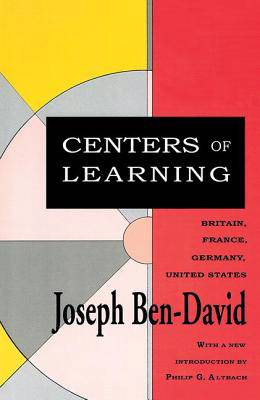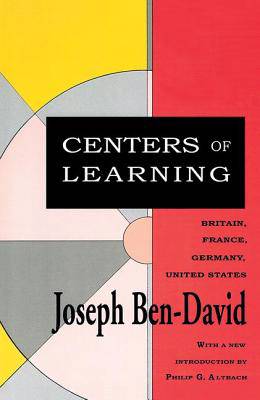
- Retrait gratuit dans votre magasin Club
- 7.000.000 titres dans notre catalogue
- Payer en toute sécurité
- Toujours un magasin près de chez vous
- Retrait gratuit dans votre magasin Club
- 7.000.0000 titres dans notre catalogue
- Payer en toute sécurité
- Toujours un magasin près de chez vous
Centers of Learning
Britain, France, Germany, United States
91,95 €
+ 183 points
Description
The universities of Britain, France, Germany, and the United States stem from a common European academic tradition and are today among the most influential and powerful in the world. Each has cultivated a high degree of scientific excellence and intellectual autonomy and has served as a model for world higher education. Yet these four systems are structurally distinct and show considerably different patterns of development. In Centers of Learning Joseph Ben-David explores these differences and provides insight into the role and scope of contemporary higher education.Although the movement toward modem systems grew out of shared convictions and practical needs, Ben-David's comparative analysis shows that educational reform had surprisingly different consequences in America, England, Germany, and France. In France, higher education became identified with the purposes and authority of the state through specialized training for various professionals. In contrast, the German reforms consolidated the scholarly disciplines under a highly centralized university system with no special status accorded to the professional faculties. In England, Oxford and Cambridge adopted the German model, but smaller specialized institutions established a tradition of academic diversity and community 'service. The modernization of the American system followed the European reforms in updating the scientific curriculum and following the university model, but with a special emphasis on extending higher educational status to a broad strata of the population.In assessing the development of these systems, Ben-David finds their greatest success in extending the prestige and benefits of higher learning to the professions. General education, while strong in America, has suffered in the European systems, especially through its slackening ties to research. Centers of Learning contains a forceful critique of the politicization of the academy. Ben-David sees the furthering of social justice and equality as a necessary, though controlled part of the university's mission. Uncontrolled, political criticism will have the potential for disrupting educational functions and undermining the relationship between the university and society. In undertaking a historical survey of national education endeavors, this volume clarifies the contexts of current problems and inadequacies. Its broad-ranging analyses and proposed solutions make it essential reading for educators, social historians, political scientists, and sociologists.
Spécifications
Parties prenantes
- Editeur:
Contenu
- Nombre de pages :
- 228
- Langue:
- Anglais
- Collection :
Caractéristiques
- EAN:
- 9781560006046
- Date de parution :
- 30-01-92
- Format:
- Livre broché
- Format numérique:
- Trade paperback (VS)
- Dimensions :
- 154 mm x 228 mm
- Poids :
- 381 g

Les avis
Nous publions uniquement les avis qui respectent les conditions requises. Consultez nos conditions pour les avis.





